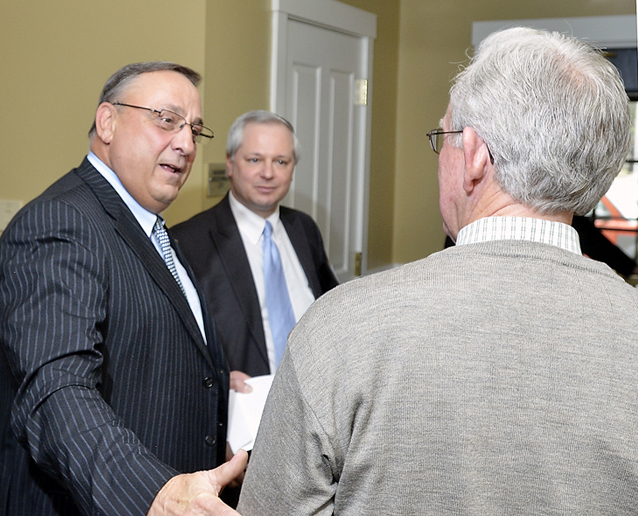BRUNSWICK — Gov. Paul LePage said Wednesday he has not yet decided whether to veto the bill to gradually increase the minimum wage in the state to $9 per hour, but he would review the issue when it makes it to his desk. Maine’s current minimum wage is $7.50 per hour.
“You can’t have the highest minimum wage in the country when your economy is in the tank,” LePage said after speaking at the Southern Midcoast Maine Chamber in Brunswick.
Washington state currently has the highest minimum wage at $9.19 per hour.
The bill would raise the minimum wage in stages until it is $9 per hour in 2016, and after that would be adjusted annually for inflation.
It won final Maine House approval on Tuesday and was sent to the Senate, where lawmakers are still working out the cost of the bill.
The LePage administration previously has spoken against the bill, but LePage stopped short of commenting on what his actions would be if lawmakers passed the bill and sent it to him for his signature.
Maine’s minimum wage has stayed at $7.50 per hour since 2009. Still, it is higher than the current national minimum of $7.25 per hour.
The measure echoes a call by President Obama to increase the national minimum wage to $9 per hour.
Democratic supporters have said the national minimum wage hasn’t kept pace with the rising cost of basic living necessities. Higher wages would boost the purchasing power of low-income workers and help fuel the economy, they say. Republican opponents nationally have said a higher minimum wage would hurt small businesses and would be ineffective at reducing poverty.
In speaking to members of the chamber Wednesday, LePage focused on key initiatives such as improving education, cutting energy prices and repaying hospitals money owed to them by the state.
“Pay your bills, lower energy costs and prepare your workers for a new generation of jobs,” LePage said, outlining his priorities.
LePage said the state spends roughly $15,000 per student per year on education. He said that is higher than other states, such as Florida, that spend less per student annually yet see higher student performance.
“We get very poor performance. … Maine students are performing the same as they were 20 years ago. The rest of the country is adopting ‘best practices,’ ” LePage said.
LePage reiterated that the state plans to grade every school in Maine using a scale of A through F. Those grades will be released by the end of the school year, said Adrienne Bennett, LePage’s spokeswoman.
The Southern Midcoast Maine Chamber refused to allow the media to photograph or videotape LePage during his remarks. The chamber made its own video.
After speaking at the luncheon, LePage left for the Job Creators Alliance’s Free Enterprise Leadership Summit in Florida.
Send questions/comments to the editors.



Comments are no longer available on this story